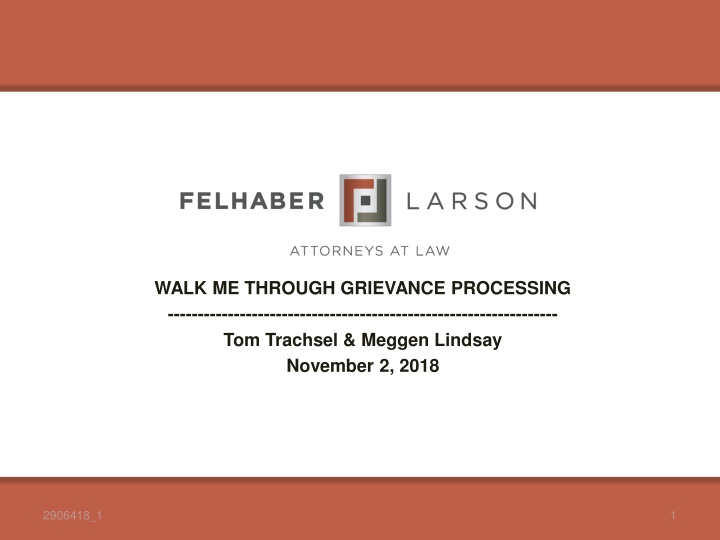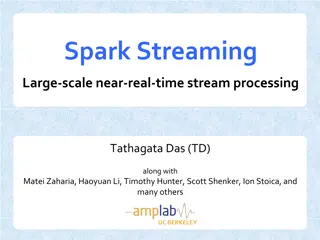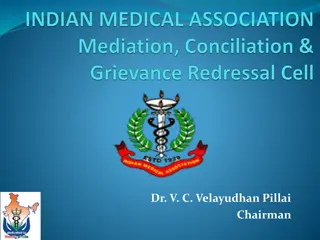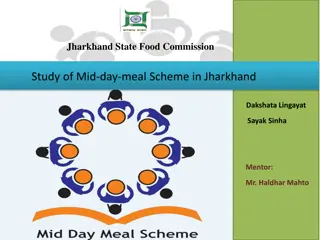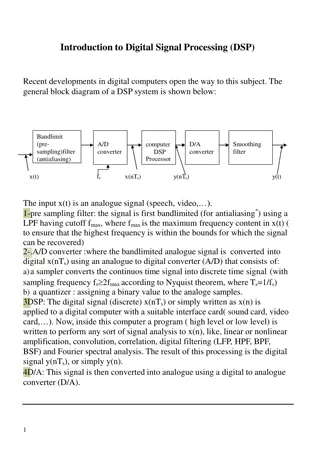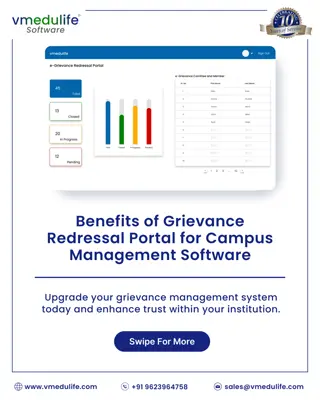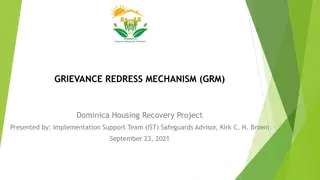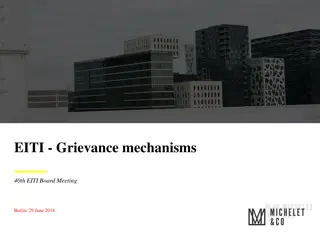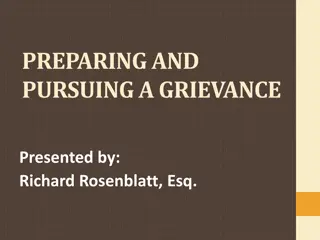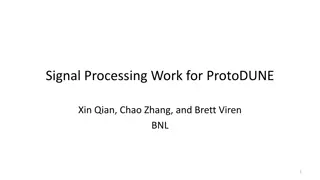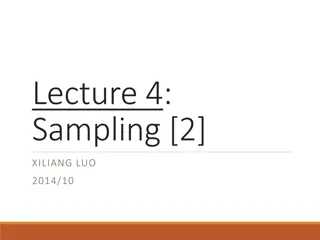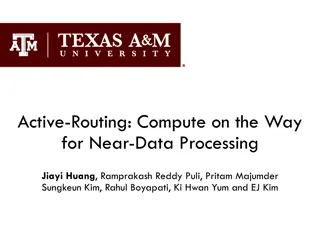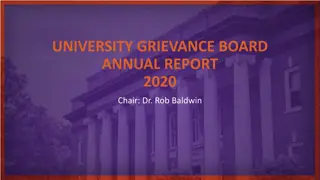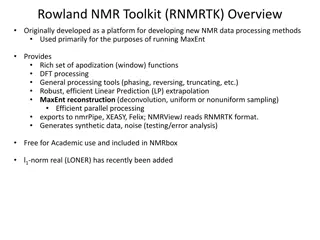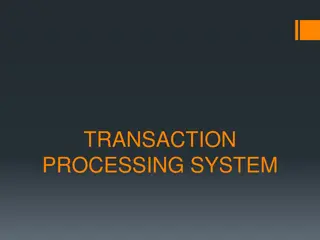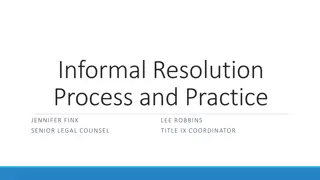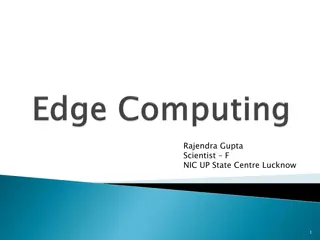Grievance Processing: Understanding the Process and Types
A grievance is a formal claim by the Union that the Employer violated the collective bargaining agreement. Grievance processing involves contract interpretation and discipline issues. Causes of contract interpretation grievances include situations where the contract is silent, unclear, or the Union is mistaken. Discipline grievances revolve around employee actions, disciplinary measures, and due process rights.
Download Presentation

Please find below an Image/Link to download the presentation.
The content on the website is provided AS IS for your information and personal use only. It may not be sold, licensed, or shared on other websites without obtaining consent from the author.If you encounter any issues during the download, it is possible that the publisher has removed the file from their server.
You are allowed to download the files provided on this website for personal or commercial use, subject to the condition that they are used lawfully. All files are the property of their respective owners.
The content on the website is provided AS IS for your information and personal use only. It may not be sold, licensed, or shared on other websites without obtaining consent from the author.
E N D
Presentation Transcript
WALK ME THROUGH GRIEVANCE PROCESSING ----------------------------------------------------------------- Tom Trachsel & Meggen Lindsay November 2, 2018 2906418_1 1
What is a grievance? In general, a grievance is a formal claim by the Union that the Employer has, in some manner, violated or breached the union contract a/k/a the collective bargaining agreement. Most collective bargaining agreements contain a definition for a grievance. Sometimes a contractual provision will specifically state that a dispute over that provision is subject to the grievance procedure. 2 2906418_1
Grievance Charge A grievance must be distinguished from- Unfair labor practice (ULP) charge A grievance is a claim that the Employer breached the contract; it is submitted to, or filed with, the Employer. A ULP charge is a claim that the Employer violated the National Labor Relations Act (NLRA) (i.e., committed an unfair labor practice or ULP). A charge is filed with, and investigated by, the National Labor Relations Board (NLRB). 3 2906418_1
Two types of grievances 1. Contract interpretation. The Union claims that the Employer has not followed a requirement of the contract, or has improperly made a change of some sort. The burden is on the Union to establish a breach of the contract. At an arbitration hearing, the Union presents its case first. 2. Discipline. The Union claims that the Employer disciplined or terminated an employee without just cause. The burden is on the Employer to establish that it had just cause to discipline or terminate the employee. At an arbitration hearing, the Employer presents its case first. 4 2906418_1
Causes of contract interpretation grievances 1. 2. The Employer actually did not follow the contract. The contract is silent on the issue. This situation is often the source of union claims of past practice. There is language in the contract on the general issue, but the language does not answer the specific question one way or the other. The Union must take a stand because the issue is important to the Union, or because the Union is attempting to advance some particular agenda. The Union is simply mistaken as to the correct application of the contract. 3. 4. 5. 5 2906418_1
General types of Union claims in discipline grievances 1. 2. The employee didn t do it. The employee did it, but had no idea that it was against Employer rules or procedures. The employee did it, but the level of discipline issued by the Employer was too severe. The employee did it, but other employees have done the same thing and received zero or lesser discipline. The employee was denied his/her due process rights. 3. 4. 5. 6 2906418_1
Typical steps in the grievance process 1) Informal discussion between the employee and/or union steward and the supervisor / manager. 2) The Union submits or files the written grievance. 3) The parties hold a grievance meeting to discuss the grievance. 4) The Employer sends a written response to the Union s grievance. 5) The Union sends a letter to the Employer, demanding to arbitrate the grievance. 6) Arbitration The Employer and the Union present their evidence and arguments to a neutral arbitrator at a hearing; the arbitrator hears the case and issues a decision a/k/a the arbitrator saward. 7 2906418_1
Blasting-off Fireworks in the CocoaNana Parking Lot 8 2906418_1
CocoaNana Company (CocoaNana or theCompany) produces, bottles, and sells drinkable yogurt that combines the delicious flavors of banana and chocolate. CocoaNana operates a facility located in Albert Lea, Minnesota. (The bananas are shipped from Central America.) For approximately 20 years, the production and maintenance employees at CocoaNana s Albert Lea facility have been represented for purposes of collective bargaining by Food Production Workers of America (FoPWA), Local 355. There are approximately 100 employees in the bargaining unit. The parties are mid-term in a three-year collective bargaining agreement. The Company maintains a list of Plant Rules, which is posted near the time clock and in the breakroom. There are 18 rules on this list, including the following: #16 Employees are prohibited from possessing fireworks on company premises. Any employee lighting-off fireworks on company property is subject to immediate termination from employment. 9 2906418_1
Rule #16 was implemented in 2002 after a fireworks accident in the parking lot involving Johnny ( Fingers ) Smith. At approximately 4 p.m. on Thursday, June 21, 2018, HR Manager Marcus Gonzalez heard fireworks while sitting at his desk in his office. Gonzalez promptly started an investigation. He interviewed two employee witnesses (A & B). A reported that he witnessed bargaining unit employee Hannah Chang light a fuse and running away. B stated that she heard the fireworks and saw them up in the air, but did not see who lit them. Employee (C) was driving out of the parking lot at the time (after finishing her shift) and was off work June 22, so Gonzalez did not interview her. However, Gonzalez sent her an e-mail message on June 21 asking, Did you see any employees shooting-off fireworks in the parking lot today? That night, she replied: Yes, I saw that someone was lighting fireworks today in the parking lot; I believe it was Steve Dean. Steve Dean who is Employee C s ex-boyfriend punched-out at 11 a.m. on June 21 to go to a doctor s appointment. 10 2906418_1
Gonzalez interviewed Chang on Friday, June 22. Chang denied lighting-off fireworks the day before. On June 22, Chang was terminated from employment for lighting-off fireworks in the parking lot on June 21. The Union filed a grievance over the termination on July 11. Union representative Ursula Robinson was on vacation from July 2 through July 10. The contract states that a grievance must be filed within ten working days of the occurrence. The plant was closed on Tuesday, July 3, and Wednesday, July 4. The Company believes that the Union s grievance was untimely. On July 12, Robinson sent an e-mail message to Gonzalez, asking to schedule a grievance meeting and requesting the following: 11 2906418_1
1) A list of all instances in which an employee was disciplined for a violation of the no-fireworks rule (Plant Rule #16) since it went into effect. Include instances involving supervisors and management. 2) A list of all instances in which the Company was aware or learned of a violation of Plant Rule #16, but the employee was not disciplined, since it went into effect. Include instances involving supervisors and management. 3) Payroll or timeclock records for all employees who worked on June 21. 4) Witness statements from anyone who was a witness in the Company s investigation that led to the decision to terminate Hannah Chang. 5) Notes from interviews of witnesses. I must receive all of this information before we hold a grievance meeting. 12 2906418_1
Question #1 Put yourself in Marcus Gonzalez shoes. Chang was terminated on June 22. The grievance was filed on July 11. The contract states that a grievance must be filed within ten working days of the occurrence. The Union missed the deadline for filing a grievance. How do you respond to union representative Ursula Robinson s request to schedule a grievance meeting? See next slide. 13 2906418_1
Question #1 How do you respond to union representative Ursula Robinson s request to schedule a grievance meeting? a) Ursula, You missed the deadline for filing the grievance. I decline your request to schedule a grievance meeting. Have a nice day. b) Ursula, It seems to me that you missed the deadline for filing a grievance. However, as a professional courtesy, I am agreeable to meeting to discuss this grievance. I m available as follows ______. c) Ursula, I would love to meet you to discuss this grievance. Just name the date and time, and I will move anything on my calendar for this. 2906418_1 14
Question #2 How do you respond to the information request? 1) A list of all instances in which an employee was disciplined for a violation of the no-fireworks rule (Plant Rule #16) since it went into effect. Include instances involving supervisors and management. 2) A list of all instances in which the Company was aware or learned of a violation of Plant Rule #16, but the employee was not disciplined, since it went into effect. Include instances involving supervisors and management. 3) Payroll or timeclock records for all employees who worked on June 21. 4) Witness statements from anyone who was a witness in the Company s investigation that led to the decision to terminate Hannah Chang. 5) Notes from interviews of witnesses. 15 2906418_1
When should the grievance meeting be held? Many contracts identify the time by which a grievance meeting is to be held. However, it is the Union s grievance, and therefore it is the Union s obligation to push it forward. The Employer is not going to lose a grievance because a grievance meeting is held on an agreed-upon date a couple of days late. Often the Union will make an information request, and will want to receive and review the requested information before the grievance meeting. This is reasonable, and also helpful to management. 16 2906418_1
Where and how will the grievance meeting be held? It is much better to hold grievance meeting in-person than over the phone. A conference room is better than a private office. Sometimes it makes sense to hold a grievance meeting offsite (i.e., somewhere other than the Employer s premises). 17 2906418_1
Who attends the grievance meeting? Who would we expect to attend on the Union s side? One or two union stewards. Full-time union agent (usually, but not necessarily). The Grievant(s) (typically not required, though). Employee witness(es). 18 2906418_1
Who attends the grievance meeting? Question #3 Who should attend the grievance meeting on behalf of management? a) Only Marcus Gonzalez; it s a waste of time and resources to have anyone else present on behalf of management. b) Marcus Gonzalez and one or two additional members of the HR team or management. c) The entire leadership team as a show of unity, strength, and support. 19 2906418_1
Who attends the grievance meeting? Question #4 Union representative Ursula Robinson sends an e-mail message to Marcus Gonzalez (i.e., you), requesting that supervisor Johnny ( Pyro ) Johnson be in attendance at the grievance meeting. How do you respond to Ursula? a) Never. Absolutely not. Have a nice day. b) Hello. Mr. Johnson was not involved in the investigation or the decision to terminate the Grievant. Could you please explain why you are requesting his presence at the grievance meeting? c) Of course. Is there anyone else you want me to have there? Also, what is your favorite afternoon snack? 20 2906418_1
What should happen during the grievance meeting (including tips for management)? The purpose of the grievance meeting is for the Union 1) to explain in detail the Union s basis for its claim that the Employer has breached the contract; and 2) to specify exactly what the Union is seeking to remedy in the grievance. Continued, next slides 21 2906418_1
Your job at the grievance meeting is to get the Union to explain in detail o The facts that the Union is relying upon. o The precise articles or sections of the contract that the Union is contending were breached. o How the relied-upon facts result in or translate to a violation of the cited contract provision(s). o What the Union is asking the Employer to do in order to remedy the alleged breach. o What is the basis or rationale for seeking that as the remedy. 22 2906418_1
Why do we want to get this info from the Union during the grievance meeting? 1. To determine the merits of the Union s grievance (or lack thereof). 2. To assess whether it makes sense to resolve the grievance or fight it (depends upon merits and requested remedy). 3. To enhance management s ability to thoroughly and efficiently prepare for an arbitration hearing. 4. To box the Union in. a. Limit the Union s ability to make shifting arguments. b. Prevent the Union from changing its legal position. c. Prevent the Union s witnesses from later making-up facts or changing their stories. 23 2906418_1
The grievance meeting is NOT. a forum for the Union to conduct its investigation into the grievance. an opportunity for the Union to cross-examine HR or department leadership. the venue or setting for the Union to extract management s justification for whatever the Employer supposedly did or didn t do that precipitated the grievance. Always remember that the grievance meeting is for the Union to convince the Employer that it should agree to whatever the Union is seeking. This does mean that you should be very careful and deliberate about what you share with the Union during the grievance meeting. 24 2906418_1
Question #5 Without getting an explanation from Ursula, you bring Johnny ( Pyro ) Johnson to the grievance meeting. At the start of the meeting, she starts asking Johnny questions about him lighting-off fireworks in the parking lot, and being present on other instances when different employees were doing so. How do you handle the situation? a) Immediately terminate the grievance meeting and walk out of the room (with Johnny). b) Calmly and professionally tell Ursula that the grievance meeting is for the Union to share why it believes there was a breach of the contract not for the Union to conduct its investigation by interrogating a member of management. c) Join in with Ursula, and double-team Pyro on the interrogation. 25 2906418_1
Sending the grievance response letter. After the grievance meeting, within the timeline established by the contract, the Employer needs to send the grievance response letter to the Union. 26 2906418_1
Sending the grievance response letter. Question #7 Hannah Chang was a 10-year employee with an exemplary record. Marcus Gonzalez believes that she has learned her lesson and would never again light-off fireworks in the parking lot. Therefore, CocoaNana is willing to let her return to work (with no backpay) provided that she signs a last-chance agreement. True or False Your grievance response letter should be as follows: We held the grievance meeting on [date]. This is the Company s grievance response letter. After further consideration, we are willing to allow Ms. Chang to return to work with no backpay, on the condition that she signs a last chance agreement, stating that she will never again light fireworks in the parking lot. 27 2906418_1
Sending the grievance response letter. Tips for the grievance response letter: The grievance response letter should almost always be very short. (See next slide.) However, it is advisable to identify any defenses related to procedural arbitrability (e.g., the Union did not file the grievance in a timely manner). Put this on letterhead, and send it via e-mail and U.S. mail. Do not make a settlement offer in the grievance response letter. Send the grievance response letter, denying the grievance. Then send separate correspondence containing the settlement offer (if it even makes sense to make the offer in writing). 28 2906418_1
Sample Step 2 response letter The parties held the grievance meeting on DATE. This is the Employer s grievance response letter. The Union has not convinced us that the Employer has breached bargaining agreement. Accordingly, the grievance is denied. the collective 29 2906418_1
Why do we want to get this info from the Union during the grievance meeting? 1. To determine the merits of the Union s grievance (or lack thereof). 2. To assess whether it makes sense to resolve the grievance or fight it (depends upon merits and requested remedy). 3. To enhance management s ability to thoroughly and efficiently prepare for an arbitration hearing. 4. To box the Union in. a. Limit the Union s ability to make shifting arguments. b. Prevent the Union from changing its legal position. c. Prevent the Union s witnesses from later making-up facts or changing their stories. 30 2906418_1
Question #8. In responding to the Union s grievance over the termination of Hannah Chang, should anything be added to the grievance response letter? The parties held the grievance meeting on DATE. This is the Employer s grievance response letter. The Union has not convinced us that the Employer has breached bargaining agreement. Accordingly, the grievance is denied. the collective 31 2906418_1
Many contracts state that the Unionsdemand for arbitration must be received by the Employer by a set deadline (usually within some number of days after the grievance response letter). If you receive the Union s demand for arbitration by U.S. mail and you have a legitimate timeliness defense as to this issue: 1) Retain the envelope; and 2) Stamp or otherwise record the date on which the Union s demand for arbitration was actually received. 32 2906418_1
At any stage in the grievance procedure 1. The Union can formally withdraw the grievance, or formally notify the Employer that it is ceasing to pursue the grievance. Typically, this will mean that the Union can no longer pursue that particular grievance over those precise facts. This will not prevent the Union from filing and pursuing a grievance over similar circumstances in the future; however, this may hurt the Union s chances if it re-raises a grievance in response to the same or a similar situation in the future. 33 2906418_1
2. The Union can simply fail to take further action to pursue the grievance. After letting the grievance sit for some period of time, the Union may or may not be able to successfully revive it. 3. The Employer can simply agree with the Union s position, and provide the Union with the remedy that the Union is requesting. This is acceptable where the Employer indisputably committed an error that amounts to a plain violation of the contract. Otherwise, the Employer should enter into a settlement agreement rather than simply accede to the Union s position. 34 2906418_1
4. The Employer and the Union can enter into a settlement agreement, resolving the grievance. Frequent terms: Statement of what the Employer is agreeing to do (e.g., make a payment in a particular amount to a specific employee, reduce or replace a level of discipline). Statement that the Union is withdrawing the grievance and/or that the agreement is a full, final, and complete resolution of the grievance, and that the grievance won t be arbitrated. Employer non-admission clause. Non-precedent-setting-language. 35 2906418_1
Question #9 Felhaber Larson labor attorneys prepare grievance settlement agreements all of the time. This work can be performed efficiently by a Felhaber Larson attorney, and a settlement agreement prepared by an attorney can save you headaches down the line. In light of this, should you: a) Prepare all of your own settlement agreements, not show them to anyone, get the Union to sign them, and cross your fingers. b) Contact your Felhaber Larson labor attorney and have them prepare a settlement agreement or at least review your draft and provide feedback. c) Let the Union prepare all grievance settlement agreements, and sign whatever they give you. After all, they are always trying to be fair. 36 2906418_1
The arbitration hearing The parties present their respective cases by calling witnesses to testify and introducing exhibits. The Union goes first in a contract interpretation case; the Employer goes first in a discipline case. In most cases, the parties submit post-hearing briefs to the arbitrator. (Briefs are usually due three or four weeks after the hearing date.) 37 2906418_1
The arbitrators decision The arbitrator reviews and analyzes the contract, the facts and documents introduced at the hearing, and the arguments made by the parties in their briefs. The arbitrator prepares and issues a written decision, which is sent to both parties. The arbitrator s task is to interpret the contract. The arbitrator does have a wide degree of latitude in reaching his/her decision. However, the arbitrator cannot add to, modify, or subtract from the contract, and in certain limited circumstances, it is possible to challenge the arbitrator s decision by filing a motion to vacate in District Court. The arbitrator has significant discretion to determine the remedy, if he/she concludes that there was a breach of the contract. 38 2906418_1
Tom Trachsel | Meggen Lindsay ttrachsel@felhaber.com mlindsay@felhaber.com 612/373-8432 | 612/373-8424 2906418_1 39
